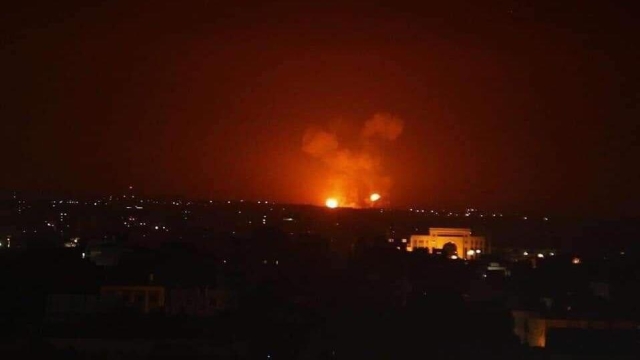In a recent development in eastern Syria, reports emerged late Tuesday of an airstrike carried out by unidentified aircraft. According to international sources, this operation targeted positions held by pro-Iranian militias in the vicinity of Bukhmal, a city near the Iraqi-Syrian border. Notably, this region plays a pivotal role in the illicit smuggling corridor connecting Iran to Lebanon.
Unusual for Syrian media, there was acknowledgment of an attack in the eastern part of the country. A Syrian military official, speaking through channels loyal to the Assad regime, disclosed that "at approximately 11:50 p.m., Israel conducted a strike on multiple positions of our armed forces in the Deir Ez-Zor area. This offensive resulted in injuries to two of our soldiers and inflicted damage on the location." Reports also indicated explosions and disruptions in the aftermath of the strike, as claimed by Syrian opposition forces, who assert that the targets included pro-Iranian militia sites, a military airfield, and various other installations.
Israel destroys Iranian weapons shipment in alleged Syria airstrike | https://t.co/xS8znkO26G
— The Jerusalem Post (@Jerusalem_Post) October 1, 2023
📷@Reuters pic.twitter.com/yAFilNEXWd
According to the Syrian Observatory for Human Rights, a London-based organization, the area struck housed an anti-aircraft battalion jointly operated by the Assad regime's forces and pro-Iranian militias. It is worth mentioning that on September 21, photographs surfaced of Ismail Qaani, the commander of the Quds Force in Iran's Revolutionary Guards, during a visit to a military base in Syria. The training exercises that followed appeared to involve both Assad's forces and Iranian contingents, with a focus on the eastern region of Syria.
Earlier in the week, there were reports of explosions in the Damascus region. The Syrian Center for Human Rights reported that these explosions occurred within a facility linked to the Assad regime and the Revolutionary Guards, resulting in the deaths of two foreign nationals. Arab sources suggested that this could be attributed to an Israeli airstrike.
Syrian opposition figures reacted to these events by speculating, "The targeted structure may have served as a storage facility or a hub for the transit of precision weaponry from Syria to Lebanon. The identities of the deceased, whether Iranian or Lebanese, remain unconfirmed." Additionally, there were suspicions of a connection between this facility and Hezbollah.
אל - מיאדין המקורב לחיזבאללה:
— כל החדשות בזמן אמת 🟢 (@Saher95755738) September 30, 2023
״מערכות ההגנה הופעלו בשמי בירת סוריה - דמשק בעקבות תקיפה ישראלית.״ pic.twitter.com/OTRw1XPddH
In a recent interview, an IDF general provided insights into the Syrian situation, particularly concerning the substantial presence of Hezbollah and Iran, which has compelled Israeli responses. The general emphasized, "Assad is entering his fifth year of controlling 70 percent of the territory. His alliances extend to nations like Qatar, and he maintains a sense of obligation to the Iranians and Hezbollah for their support, which has sustained his rule. Assad has allowed not only his own regime but also Iranian and Hezbollah forces to establish themselves in proximity to the Israeli border, a situation that we cannot tolerate."


